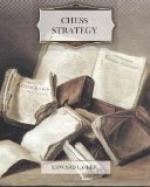In bringing the teachings of this book under the collective heading “Chess Strategy,” it was not in any way my intention to draw anything like an exact parallel between the manoeuvres on the chess-board and military operations in actual warfare. In trying to seek such analogies there is great danger of being led astray, and little likelihood of gaining knowledge that might be of use in practical play. Plain common-sense will give us all we need, without our being influenced by those tactical and strategical considerations that have been found useful in war.
The following definition may not be out of place: Strategy sets down the whole of the problems which must be solved in war, in order to attain the ultimate result aimed at; tactics solve such problems in various ways, and according to the conditions prevailing in the particular case. Sound strategy, when setting the task, must never lose sight of tactical practicability, and only a thorough knowledge of tactical resources makes correct strategy possible.
Now we shall not under any circumstances, as unfortunately even great chess masters have done, seek in outward similarities justification for transferring to chess the teachings of the strategy and tactics of war. It sounds pretty enough to say: Chess is a game of war—the various pieces represent the various kinds of forces: the pawns represent the infantry, the Knights take the place of cavalry, the Rooks do the work of heavy artillery, sweeping broad lines; the different ways in which the pieces move find a parallel in the topography of the theatre of war, in that the various battle-fields are more or less easy of access. But it is quite unjustifiable to assign to the Knights the functions of scouts, and to say that Rooks should stay in the background, as heavy artillery, and so on. Such pronouncements would not have the slightest practical value. What we take from the science of warfare is merely the definition. In each game the strategy of chess should set us the tasks which must be accomplished (in order to mate the opponent’s King), and tactics point the way in which it is possible to solve such problems. Correct chess strategy will only set such tasks as are tactically possible, and, if we wish to expound the principles of chess strategy, we cannot exclude chess tactics from the field of our observations. If here and there the results of our deliberations bear some analogy to actual warfare, we may certainly give way to a kind of aesthetic satisfaction in that our own occupation has some parallel in real life, but we must never fashion our principles in accordance with such fortuitous circumstances.
Having surveyed the problems we have to solve, we can now plunge into our subject.




